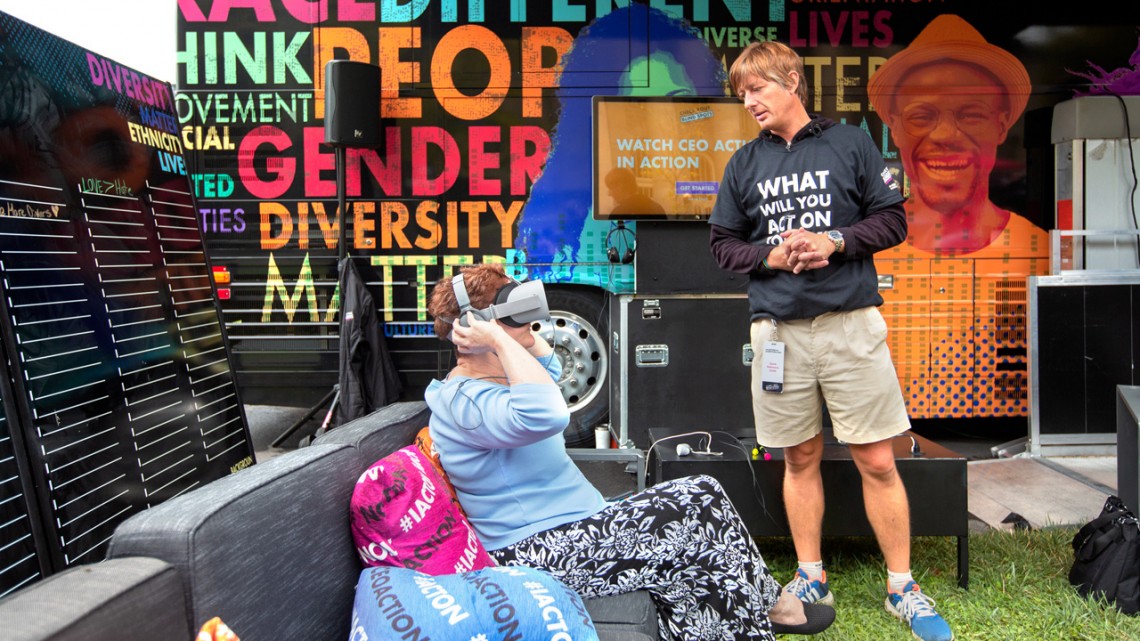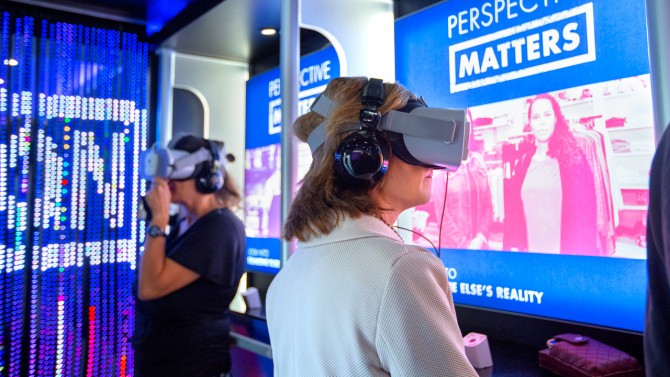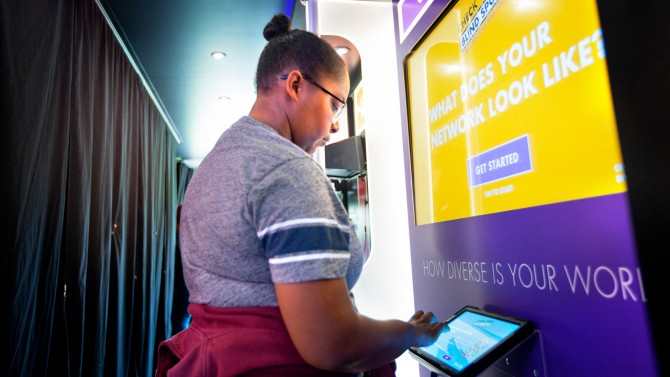
Visitors to the Check Your Blind Spots bus participate in virtual reality exercises in a lounge set up outside the bus.
Diversity awareness bus highlights lived experiences
By Daniel Aloi
Students, staff and faculty learned about the nuances of unconscious bias when an educational bus came to campus Sept. 16.
The Check Your Blind Spots bus, an initiative of CEO Action for Diversity & Inclusion, is visiting more than 100 sites this year. The mobile installation contains several immersive and interactive elements, such as answering a series of questions on a touchscreen about the people in your network, and stations where you can hear and see someone tell their story or view different interactions among people.
“I did my own profile of who I spend my time with, which you sort of know, but it was eye-opening how homogeneous my circle is,” said Mary Opperman, vice president and chief human resources officer for the university. “The virtual reality element gave me an opportunity to be present in a situation that was very different from anything I have experienced, and I got the chance to think about it at a deeper and more personal level. I found it very effective.”
Nearly 300 people toured the bus during its five-hour stop at Cornell, which was organized by the Department of Inclusion and Workforce Diversity. Several administrators including Provost Michael Kotlikoff took the tour, along with students and staff who lined up on the Arts Quad in front of Goldwin Smith Hall as they waited to enter the bus.
Inside were stations using audio, video, interactive gaming technology and virtual reality to explore situations where bias can be experienced, such as workplace meetings, retail stores and urban neighborhoods.
“I was eager to try it out,” said Michael Fontaine, professor of classics and associate vice provost of undergraduate education. “The virtual reality thing was really amazing, more immediate than any of the similar activities I’ve done. The idea is that you can never really know what it’s like to be someone else, but this seems like a high-tech, 2019 way of trying to get you as close as you can. I really think this is going to resonate with a lot of people.”
Avery August, Ph.D. ’94, professor of immunology and vice provost for academic affairs, encouraged his colleagues to come check it out.
“I tried two of the activities, and both of them felt personal to me because I’ve had those experiences, on both sides,” August said. “I’m not sure how many people understand that lens in which you are being viewed. Assuming the persona of the person really puts you in that place.”
Seeing someone else’s lived experiences can have personal significance for virtually anyone taking the tour.
“Even from the very beginning [of the tour], on the phone conversations, the biases surrounding accent were something that resonated with me,” said a staff member and recent alumna, who preferred to speak anonymously. “My dad’s side of the family is from Pakistan, and for people who have accents, to varying degrees, it’s something that I’ve seen happen, I’ve witnessed firsthand. To me [it] was very important that they were showcasing those types of preconceived notions about people.”
The tour ended with additional resources from CEO Action, including videos (also available online) and a room where participants can record their own experiences of unconscious bias and impressions of what they learned on the bus. Executives involved with CEO Action listen to these testimonials, said Mischa Lewis, tour coordinator.
“I’m so happy we’re bringing this experience to college campuses, because this is our future workforce and we’re trying to prepare them,” Lewis said. “This will help [students] go into the workforce with conscious, open minds.”
Media Contact
Get Cornell news delivered right to your inbox.
Subscribe


